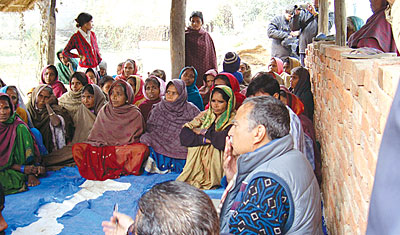 |
Upadhyay shares the ï��200,000 award this year with activist Nnimmo Bassey (Nigeria), Bishop Erwin Kräutler (Brazil), and Physicians for Human Rights (Israel). Often referred to as the 'Alternative Nobel', the Right Livelihood Award has in the past honoured people like Canadian environmental activist and broadcaster, David Suzuki, the Kenyan campaigner Wangari Mathai, Indian environmentalist Vandana Shiva, and American ecological economist Herman Daly. The award will be presented in the Swedish parliament on 6 December, just before the Nobel Prize.
In an interview, Upadhyay talks about Nepal's current development status and the philosophy behind SAPPROS .
Nepal has just emerged from conflict, and faces political instability. How has this affected development?
Nepal is in a flux, warring parties are not coming to an agreement and the constitution-making process is hanging in the balance. People are extremely insecure and their faith in democracy is being shattered. Government structures are completely dysfunctional, the service delivery system is ineffective â�" there are huge policy and governance deficits.
Despite the political stalemate, people have started getting organised in order to provide essential public goods and services. Nepal can come out of poverty if we strongly believe in and support the creativity of the poor and show long-term commitment towards their cause.
How do you define poverty?
Poverty has traditionally been measured in the form of income needed for minimum subsistence, often given in predefined calories. Recently, this measure has been criticised as inadequate in reflecting the conditions in which the poor live. The poor are constrained due to a lack of access to resources, assets and services that are vital for the improvement of their quality of life. Using the Multidimensional Poverty Index, Nepal is the poorest country in South Asia, with 64.7 per cent poor people. Using conventional income and consumption indicators, only 31 per cent of the Nepalese population is poor.
What structural deficit is at the heart of the poverty in Nepal?
There is an unequal power relationship based upon patronage-client relationships, leading to the exploitation of the poor. Tenants and small producers are exploited through production and market relations, also accentuated by a lack of remunerative employment opportunities in the villages because of sluggish growth of the agricultural sector. There is also exploitation of the poor due to monopolised land and product-markets controlled by landlords.
Is there a common formula that works in bringing villages out of poverty?
One factor which binds people together is the concept of sharing and caring that is manifested in community-based activities. We are trying to use this community spirit to build a base of stronger self-governing organisations, developing their problem-solving capabilities. Following a participatory approach and involving people in the planning, design, execution and management of small projects in rural areas will enhance their capacity and increase impact and sustainability. This will secure the base and strengthen democracy at the grassroots.
What are the main obstacles you encounter in your work?
The major one is a lack of long-term commitment to poverty programs. Government policies are seldom pro-poor, and often institutions designed to help the poor are not sensitive to their real needs. Donors remain in a cocoon and try to maintain their own turf and do not like to give long-term commitments, even to good projects.
In our work with the poor, we need a lot of flexibility because of the action-learning aspect, which is not usually supported by the traditional donor. Coordination becomes very difficult due to differences in work styles and missions, which often conflict. The effectiveness and efficiency of service delivery systems improves once communities are involved in service delivery and have control over resources, including external funding. Once the poor own the process and also contribute with resources, they will identify the demands and choose the technology and process which is appropriate and sustainable.
How would you formulate the basic paradigm of your work?
It is based on preserving the dignity and integrity of the poor. The poor are treated as subjects, and not objects, of development and own the process and manage resources through their own organisations. We want SAPPROS to promote self-governing institutions at the grassroots level, enhancing its capacity to do action research and training in the areas of social mobilisation and development of self-governing organisations. The participatory action research and training methodologies need to be readjusted so that they can also be used by other countries.
www.sappros.org.np
www.rightlivelihood.org
READ ALSO:
Badi life, DEWAN RAI


